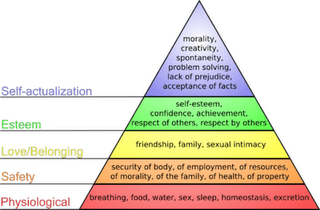Self-Esteem and Self-Actualization versus the Transcendent Self
Alice D. Hoag, Ed.D.

In my counseling practice, I am often asked about the importance of a healthy self-esteem, and how to get a “better” one:
“My performance (in school, in sports, in social situations) suffers because I don’t have enough self-confidence. How do I improve my self-esteem?”
“I’ve been told my low self-esteem is what caused my eating disorder (or depression, or anxiety disorder). So how do I learn to feel better about me?”
One of the first main contributors to the whole notion of self-esteem was Abraham Maslow who, in 1943, proposed a theory outlining human motivations, which has been termed Maslow’s Hierarchy of Needs. He suggested all of our actions are motivated by the power of our unmet needs.
First come our physiological needs (food, clothing, shelter…). If we are starving or freezing, for example, Maslow suggested we would be motivated primarily by getting food or warmth regardless of whether or not we felt fulfilled in life! These physiological needs must be mostly met before we can concern ourselves with safety needs (physical health and well-being, lack of active abuse or trauma, financial stability…), which in turn must be at least somewhat satisfied before we can focus on our love/belonging needs (friendship, family, intimacy…). Esteem needs (being respected, valued and admired by others & self) can be addressed only in the context of a safe, nurturing environment in which we know we are fed, safe and loved by others. Finally, at the apex of Maslow’s hierarchy, comes the motivation to achieve self-actualization, which is a fancy word for finding meaning in life. “What a man can be, he must be,” is his famous quote about self-actualization. Maslow describes this level as the desire to accomplish everything that one can, to become the most that one can be.
So there you have it: the highest motivation a person can be prompted by is to realize one’s own life potential. To this I cry, “Baloney!”
My take on all this self-esteem and self-actualization stuff is to say that we’re missing the mark. Is this life really all about “me” and how “I” can be the most “I” can be?! Is the motive behind doing what I do simply that “I” can feel good about me? If so, that’s an awfully shallow point of existence.
My view is radical: in order to feel fully alive and fulfilled, “I” must get out of the way.
Even though I’m not known for my culinary skills, I’ll use a cooking analogy: I must be able to put “me” on a back burner, or even off the stove altogether, and merely be stirred once in a while. The main course is not “me.” It’s something greater than me. The main course is something outside of me to which I can give my time, energy, love, attention, resources, etc. To make a great meal, that something greater than myself needs to be the motivation behind all my actions, not how I feel about that something, or even how I feel about me when I’m involved in that something.
As long as I have “me” and how “I” feel as my main barometer for satisfaction in life, I’m going to find myself lacking. There’s always someone doing something in any/every area of life better than I. With “me” and my self-esteem on the main burner of my motivations for life, I’ll end up in a spiral of negative self-esteem and low self-image, and I’ll pity party my way into uselessness and despair. Or maybe I’ll flip and be angry with everyone since “I” am not reaching fame, significance, fortune, power, or whatever else makes me feel good about me.
Now let me state that “I” do have a role in this earthly life. I may not be the main course; I may be the sauce that adds that special something to the dish. The sauce is an element of a delicious mean; it’s just not the main or only ingredient.
To be fully effective as sauce, I must make sure there’s not too much of me…and not too little, either. There needs to be enough of me to add flavor, but not so much as to overwhelm. There is either too much or too little of me when I add in my past or my future: expectations, fears, worries, and anxieties, or griefs and trauma. I must learn to let go of those wounds and fears before I can place myself on that back-burner and wait to be poured out on the dish. An ideal sauce in just the right measure is the perfect complement to the dish, adding that extra something and allowing it to taste even better.
So what can that “something” be to which we give our life? Well, it can be whatever brings life into your body, mind, or soul. It’s the thing that makes you feel you are in the “flow”; the thing that, when you are involved with it, you suddenly realize you forgot the time, forgot to eat, forgot about your own aches and pains, forgot about you. You experienced what I call the “transcendent self.” You rose above “me” and “I” into another place, where you were more fully alive than if you were to focus all your energy on yourself.
It’s only in getting beyond yourself, and connecting with that something greater than yourself, that you can truly experience the joy of being alive. Some people find meaning in feeding the poor, visiting the incarcerated, rescuing animals, exploring the solar system, investigating bacteria, learning about and building on discoveries, sharing creative expressions of music or art or technology, eliciting laughter and joy from those hurting or wounded, sharing a hug or word of encouragement, pouring your heart and energy into the life of a child,…. The list is as endless as there are beings on this world.
To find self-esteem, you must transcend your own idea of what you are worth, and concern yourself with something greater than yourself. Find your flow…not in order to “find meaning” in your own life, but to allow your life to bring meaning to something greater than yourself. Only then will you realize that you truly have value and worth (and esteem) as part of that greater something…that is, if you can stop long enough from being in the flow to reflect on yourself.



